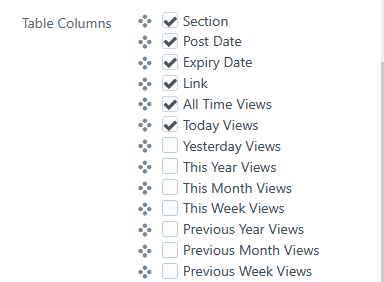Page Visits
Page visits in the Control Panel
- On the control panel and entry and category index pages, users can select table columns provided by the counter plugin to view page statistics for an element page.

WARNING
If the URL of an entry or a category changes, the statistics for the old URL will no longer be linked to the entry/category, but the data for the old URL will still be available and can be queried via pageVisits(page: $oldUrl).
Twig
twig
{% set pageVisits = craft.counter.pageVisits($pageUrl, $siteId, $attributes) %}$pageUrl: the page URL is required.$siteId: if it is not passed, the primary siteId is used. If the site of the page is not important, pass*.$attributes: an array of attributes which you want in return. The default is['all', 'allIgnoreInterval', 'today', 'yesterday', 'thisWeek', 'previousWeek', 'thisMonth', 'previousMonth', 'thisYear', 'previousYear', 'lastVisit'].
GraphQL
Getting page visits of a page
- If the
siteIdof the requested page is not passed, the primary site is sent.- You can pass
*to get the first matched page without filtering the site.
- You can pass
- You can use
@dateConvertdirective with calendar, format, locale and timezone parameters to return the last visit in the intended format
graphql
{
pageVisits(page: "https://xyz.test/page1", siteId: "*", t: uniqueParam) {
all
allIgnoreInterval
thisYear
thisMonth
thisWeek
today
previousYear
previousMonth
previousWeek
yesterday
lastVisit@dateConvert(calendar: "gregorian", format: "yyyy-MM-dd HH:mm:ss EEEE", locale: "en_US", timezone: "UTC")
debugMessage
}
}Getting page visits of entries and categories
You can directly get the page visits for the page that the element is referring to.
TIP
- The used schema should have access to the queried date ranges.
- To prevent Craft from returning cached results, you should send an
X-Craft-Gql-Cache: no-cacheheader to bypass the cache.
WARNING
If the URL of an element changes, the statistics for the old URL will no longer be linked to the element, but the data for the old URL will still be available and can be queried via pageVisits(page: $oldUrl).
graphql
{
entries {
title
url
todayViews
thisWeekViews
thisMonthViews
thisYearViews
yesterdayViews
previousWeekViews
previousMonthViews
previousYearViews
}
}